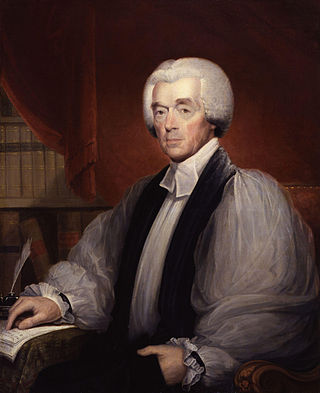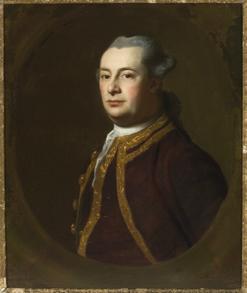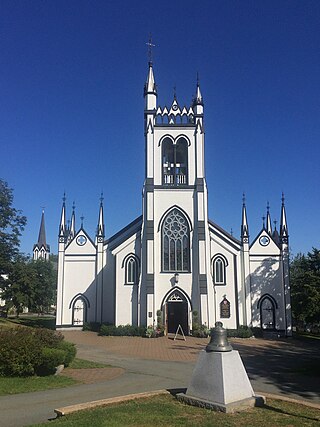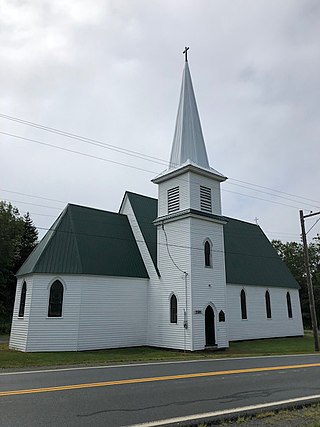
Lunenburg is a port town on the South Shore of Nova Scotia, Canada. Founded in 1753, the town was one of the first British attempts to settle Protestants in Nova Scotia.

Charles Inglis was an Irish Anglican clergyman and ardent Tory who was consecrated the first Anglican bishop in North America for the Diocese of Nova Scotia. He died at Kingston, Nova Scotia. He is buried in the crypt of St. Paul's Church (Halifax).

The Anglican Church of Canada is the province of the Anglican Communion in Canada. The official French-language name is l'Église anglicane du Canada. In 2022, the Anglican Church counted 294,931 members on parish rolls in 1,978 congregations, organized into 1,498 parishes. The 2021 Canadian census counted 1,134,315 self-identified Anglicans, making the Anglican Church the third-largest Canadian church after the Catholic Church and the United Church of Canada.

Michael Francklin or Franklin served as Nova Scotia's Lieutenant Governor from 1766 to 1772. He is buried in the crypt of St. Paul's Church (Halifax).

The Presbyterian Church in Canada is a Presbyterian denomination, serving in Canada under this name since 1875. The United Church of Canada claimed the right to the name from 1925 to 1939. According to the Canada 2021 Census 301,400 Canadians identify themselves as Presbyterian, that is, 0.8 percent of the population.

The Diocese of Nova Scotia and Prince Edward Island is a diocese of the Ecclesiastical Province of Canada of the Anglican Church of Canada. It encompasses the provinces of Nova Scotia and Prince Edward Island and has two cathedrals: All Saints' in Halifax and St. Peter's in Charlottetown. Its de facto see city is Halifax, and its roughly 24 400 Anglicans distributed in 239 congregations are served by approximately 153 clergy and 330 lay readers according to the last available data. According to the 2001 census, 120,315 Nova Scotians identified themselves as Anglicans, while 6525 Prince Edward Islanders did the same.

St. Paul's Church is a historically evangelical Anglican church in downtown Halifax, Nova Scotia, within the Diocese of Nova Scotia and Prince Edward Island of the Anglican Church of Canada. It is located at the south end of the Grand Parade, an open square in downtown Halifax with Halifax City Hall at the northern end.

The Old Burying Ground is a historic cemetery in Halifax, Nova Scotia, Canada. It is located at the intersection of Barrington Street and Spring Garden Road in Downtown Halifax.

Thomas George Spink Suther was the Scottish Episcopalian bishop of Aberdeen from 1857 to 1865 and first bishop of Aberdeen and Orkney from 1865 to 1883.

Dettlieb Christopher Jessen was one of the founding fathers of Lunenburg, Nova Scotia, and helped the village through Father Le Loutre's War, the French and Indian War and the American Revolution. He was German born. After his emigration to Canada, he became a militia leader, judge, and politician in Nova Scotia. His first name also appears as "Detleff". He represented Lunenburg County in the Nova Scotia House of Assembly from 1785 to 1793.

John Creighton was one of the founding fathers of Lunenburg, Nova Scotia. He led the settlement through the turbulent times of Father Le Loutre's War, the French and Indian War and the American Revolution. He represented Lunenburg County in the Nova Scotia House of Assembly from 1770 to 1775. After establishing the town, he lived the rest of his life in the village until he died fifty-four years later.

The Raid on Lunenburg occurred during the American Revolution when the US privateer, Captain Noah Stoddard of Fairhaven, Massachusetts, and four other privateer vessels attacked the British settlement at Lunenburg, Nova Scotia on July 1, 1782. The raid was the last major privateer attack on a Nova Scotia community during the war.

Formally known as "His Majesty's Council of Nova Scotia", the Nova Scotia Council (1720–1838) was the original British administrative, legislative and judicial body in Nova Scotia. The Nova Scotia Council was also known as the Annapolis Council and the Halifax Council. After 1749, when the judicial courts were established, the Nova Scotia Council was limited to administrative and legislative powers.

The Zion Evangelical Lutheran Church is a church in Lunenburg, Nova Scotia. The church is the home of the oldest active Lutheran congregation in Canada. German Lutheran settlers arrived in 1753 and held services in the open air and later at St. John's Anglican Church (Lunenburg). The first church on this site was built in 1772 in preparation for the arrival of its first pastor, the Rev. Mr. Friederich Schultz at Lunenburg. He stayed for 8 years.

St. John's Anglican Church was the first church established in Lunenburg, Nova Scotia, Canada (1753). It is the second Church of England built in Nova Scotia, and is the second oldest continuous Protestant church in present-day Canada. Early on 1 November 2001, St. John's church suffered significant damage by fire. It was restored and re-dedicated June 12, 2005.
James Cuppaidge Cochran (1798–1880) was an Anglican priest and editor in Lunenburg and Halifax, Nova Scotia. He was a minister at St. John's Anglican Church (Lunenburg) (1825-1852). He also published both the Colonial Churchman (1835-1840) in Lunenburg and later the Church Times in Halifax. While in Halifax, he supported the establishment of the Halifax School for the Deaf. He is the son of Rev. William Cochran (clergyman), the founder of King's College, Nova Scotia.

Jean-Baptiste Moreau was first minister at St. John's Anglican Church (Lunenburg) (1753-1770) and one of the founding fathers of the community. He was one of two missionaries who first arrived in Halifax with Edward Cornwallis (1749) and served at St. Paul's Church (Halifax). His wife had the first child born in Halifax and was named Cornwallis after the Governor. Then in 1753 he was sent to help establish Lunenburg, Nova Scotia. Rev Moreau served the community throughout the French and Indian War. He reported to Society for Propagation of the Gospel (SPG) in London, "…the number massacred by Indians in Lunenburg District during the War was 32." He learned the Mi'kmaw language and is reported to have baptised a number of Mi'kmaq children. He is buried in the crypt of St. John's Anglican Church

St. Peter's Anglican Church is a church in West LaHave, Nova Scotia that was established in 1818 by Roger Aitken, the missionary at Lunenburg for Society for the Propagation of the Gospel in Foreign Parts (1817–1825). The first church was built in 1829 and consecrated in 1834. The church remains active. Aitken gave to the church the oldest known Anglican Chalice and Paten in Canada.

Thomas Shreve was an 18th-century Anglican minister.

John Thomas Twining was a protestant minister in Nova Scotia. Twining served as principal of King’s College School in Windsor, Nova Scotia (1815-1817). He also served as a curate to John Inglis at St. Paul's Church (Halifax) (1817). Twining also became the headmaster of Halifax Grammar School (1819). He became the lifelong sinecure of the chaplain to the House of Assembly (1825). Twining fell out of favour with Inglis and was barred from entering the pulpits of parish churches. He held garrison services at 11 different buildings between 1817 and when a garrison chapel opened in 1846. He was a chaplain and educator for the garrison for the last 14 years of his life.




















